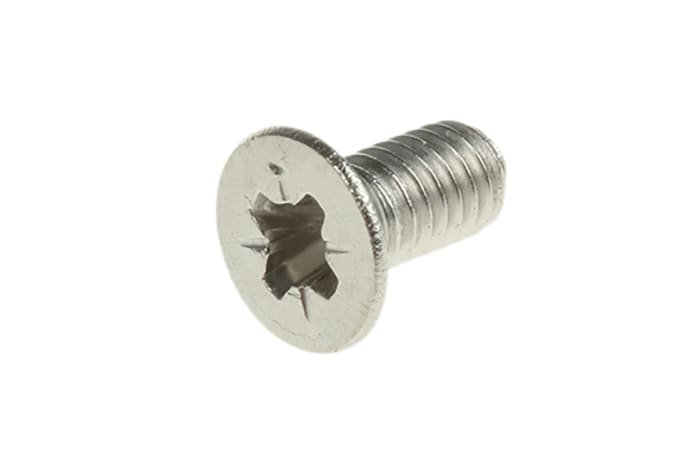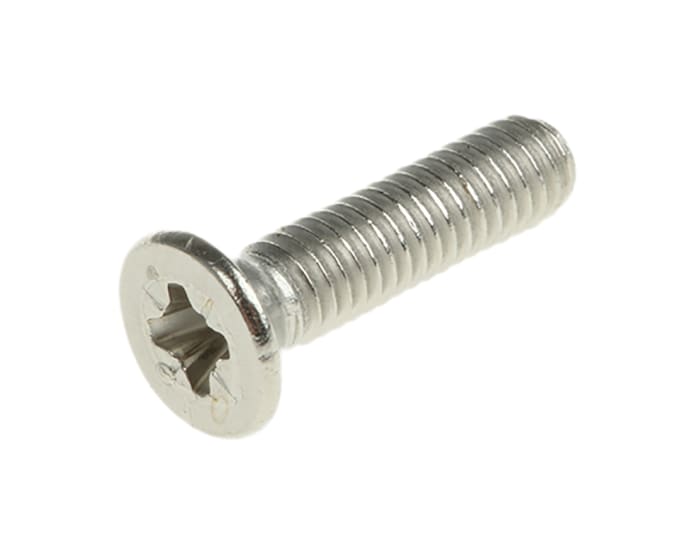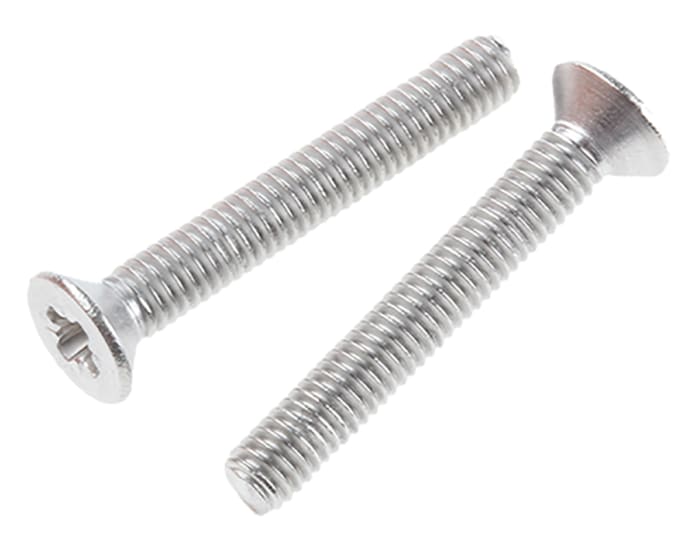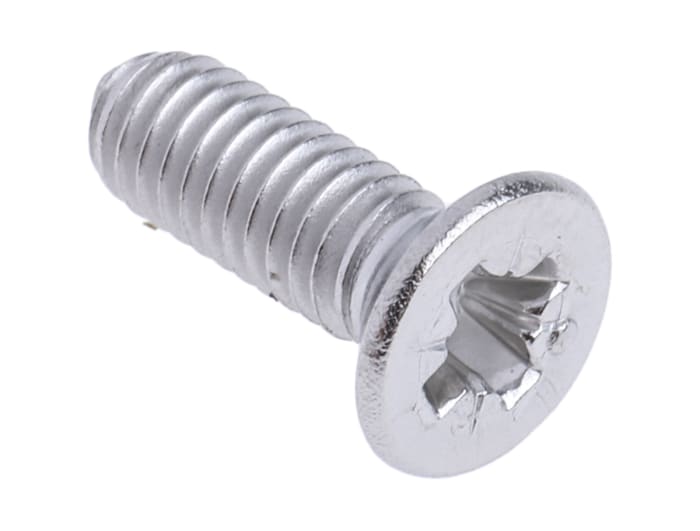RS PRO Pozi M4 Countersunk A4 316 Stainless Steel Machine Screws DIN 965 x 6.0mm

Technical documents
Specifications
Brand
RS ProHead Shape
Countersunk
Drive Type
Pozi
Length Metric
6.0mm
Thread Size Metric
M4
Material
Stainless Steel
Standards Met
DIN 965
Stainless Steel Type
A4 316
Thread Pitch
0.70mm
Product details
RS PRO A4 316 Stainless Steel Countersunk Pozidriv Machine Screws
From RS PRO a high-quality machine screw with a flat countersunk head for flush fitting and a versatile Pozidriv recess for a superior grip when tightening. This machine screw has a metric thread and is made from high quality A4 316 stainless steel which has excellent corrosion resistance. Grade 316 steel is also known as marine grade stainless steel due to its increased resistance to chloride corrosion making it ideal for use in marine applications.
What is a Machine Screw?
A machine screw is similar to a bolt but has a socket or a slot in its head that allows it to be turned by a screwdriver. The shank on a machine screw is straight rather than tapered with a full thread which is uniform along the entire length. Machine screws do not tap their own thread into materials like wood screws do but are designed to be fastened into pre-tapped holes in the parts they are fastening together. Having a threaded hole creates a stronger joint and results in a higher quality product.
What is a Countersunk Screw?
Countersunk machine screws, also known as CSK screws have a flat head design so when placed in a pre-drilled countersunk hole they will sit flush with or below the surface of the surrounding material. These screw heads are ideal for use when you need to cover the heads with a screw cap or create a flat surface for placing objects on or fixing other objects to.
What is a Pozidriv Head Type?
Pozidriv, sometimes shortened to Pozi, stands for “positive drive”. This head type has a cross recess in the centre with four small indentations around it creating 8 points of contact. This design provides improved engagement and contact with the screwdriver and prevents ejection force when tightening or loosening the machine screw.
Features and Benefits
• Pozidriv head type for improved screwdriver grip
• Countersunk head for a flush finish
• A4 316 Marine Grade stainless steel for excellent corrosion resistance, resistance to
chloride and ability to withstand extremes of temperature
• Easily cleanable
• Meets DIN 965 Standards
What are Machine Screws Used For?
Machine screws are designed to hold separate components together in a wide range of applications such as industrial machinery and vehicle engines. They are screwed through pre-drilled tapped holes in 2 components and can fastened at the rear with a nut. This marine grade 316 steel machine screw is ideal for use in the following:
• Swimming pools
• Chemical plants
• Boat deck fittings
• Dairy equipment
• Medical sterilising equipment
• Sewerage treatment plants
Frequently Asked Questions
What Does M2.5, M3, M3.5, M4, M5 Mean?
These measurements are found on metric screws, The 'M' stands for Metric. The number after the 'M' is the nominal outer diameter of the screw in mm.
How Do I Cut a Machine Screw?
Damage to the machine screw threads can prevent parts from fitting together properly, therefore care has to be taken when cutting them and the correct tools used.
Cutting a small machine screw (up to standard size #10 or metric size M5 (5mm)
Use a pair of multipurpose wire strippers or electricians pliers that feature M2.5, M3, M3.5, M4, M5 threaded holes. These holes are designed for cutting bolts without damaging the thread. Open the jaws and thread the machine screw into the correct size hole to the distance required. Squeeze the tool handles closed and the screw will be cut at the point where the two halves of the jaws come together. You will have a clean cut without any thread damage.
Cutting a large machine screw (larger than size #10 or metric size M5 (5mm)
This is best done using a hacksaw. Thread the nut on the screw until it reaches the desired point on the head side of the cutting line. Place the screw in a vice or clamp to keep it secure when cutting and cut the screw as straight as you can. When you unthread the nut it will repair and realign any threads that may have been damaged by the saw blade.
₪ 69.60
₪ 69.60 1 Bag of 100 (ex VAT)
₪ 81.43
₪ 81.43 1 Bag of 100 (inc. VAT)
1
₪ 69.60
₪ 69.60 1 Bag of 100 (ex VAT)
₪ 81.43
₪ 81.43 1 Bag of 100 (inc. VAT)
Stock information temporarily unavailable.
1
Stock information temporarily unavailable.
| quantity | Unit price |
|---|---|
| 1 - 4 | ₪ 69.60 |
| 5 - 9 | ₪ 67.10 |
| 10 - 29 | ₪ 64.72 |
| 30+ | ₪ 61.30 |
Technical documents
Specifications
Brand
RS ProHead Shape
Countersunk
Drive Type
Pozi
Length Metric
6.0mm
Thread Size Metric
M4
Material
Stainless Steel
Standards Met
DIN 965
Stainless Steel Type
A4 316
Thread Pitch
0.70mm
Product details
RS PRO A4 316 Stainless Steel Countersunk Pozidriv Machine Screws
From RS PRO a high-quality machine screw with a flat countersunk head for flush fitting and a versatile Pozidriv recess for a superior grip when tightening. This machine screw has a metric thread and is made from high quality A4 316 stainless steel which has excellent corrosion resistance. Grade 316 steel is also known as marine grade stainless steel due to its increased resistance to chloride corrosion making it ideal for use in marine applications.
What is a Machine Screw?
A machine screw is similar to a bolt but has a socket or a slot in its head that allows it to be turned by a screwdriver. The shank on a machine screw is straight rather than tapered with a full thread which is uniform along the entire length. Machine screws do not tap their own thread into materials like wood screws do but are designed to be fastened into pre-tapped holes in the parts they are fastening together. Having a threaded hole creates a stronger joint and results in a higher quality product.
What is a Countersunk Screw?
Countersunk machine screws, also known as CSK screws have a flat head design so when placed in a pre-drilled countersunk hole they will sit flush with or below the surface of the surrounding material. These screw heads are ideal for use when you need to cover the heads with a screw cap or create a flat surface for placing objects on or fixing other objects to.
What is a Pozidriv Head Type?
Pozidriv, sometimes shortened to Pozi, stands for “positive drive”. This head type has a cross recess in the centre with four small indentations around it creating 8 points of contact. This design provides improved engagement and contact with the screwdriver and prevents ejection force when tightening or loosening the machine screw.
Features and Benefits
• Pozidriv head type for improved screwdriver grip
• Countersunk head for a flush finish
• A4 316 Marine Grade stainless steel for excellent corrosion resistance, resistance to
chloride and ability to withstand extremes of temperature
• Easily cleanable
• Meets DIN 965 Standards
What are Machine Screws Used For?
Machine screws are designed to hold separate components together in a wide range of applications such as industrial machinery and vehicle engines. They are screwed through pre-drilled tapped holes in 2 components and can fastened at the rear with a nut. This marine grade 316 steel machine screw is ideal for use in the following:
• Swimming pools
• Chemical plants
• Boat deck fittings
• Dairy equipment
• Medical sterilising equipment
• Sewerage treatment plants
Frequently Asked Questions
What Does M2.5, M3, M3.5, M4, M5 Mean?
These measurements are found on metric screws, The 'M' stands for Metric. The number after the 'M' is the nominal outer diameter of the screw in mm.
How Do I Cut a Machine Screw?
Damage to the machine screw threads can prevent parts from fitting together properly, therefore care has to be taken when cutting them and the correct tools used.
Cutting a small machine screw (up to standard size #10 or metric size M5 (5mm)
Use a pair of multipurpose wire strippers or electricians pliers that feature M2.5, M3, M3.5, M4, M5 threaded holes. These holes are designed for cutting bolts without damaging the thread. Open the jaws and thread the machine screw into the correct size hole to the distance required. Squeeze the tool handles closed and the screw will be cut at the point where the two halves of the jaws come together. You will have a clean cut without any thread damage.
Cutting a large machine screw (larger than size #10 or metric size M5 (5mm)
This is best done using a hacksaw. Thread the nut on the screw until it reaches the desired point on the head side of the cutting line. Place the screw in a vice or clamp to keep it secure when cutting and cut the screw as straight as you can. When you unthread the nut it will repair and realign any threads that may have been damaged by the saw blade.



